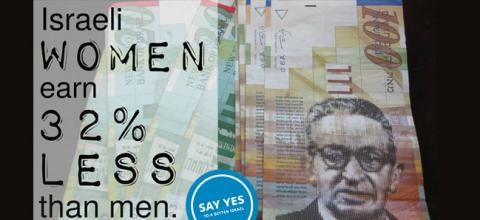Israeli minorities and women get paid less
That compared with a pay gap across the economy that on average saw women earning just 59% of what men earn, according to the report of the commission, which is part of the Prime Minister’s Office. “In spite of our successes, we face a great deal more work in connection with the large gaps in pay and the chances of employment at all in Arab and Haredi society as well as for Ethiopian-origin Israelis,” President Reuven Rivlin said at a ceremony on Monday presenting the report.
The report, which was prepared with the Central Bureau of Statistics and by Prof. Alexander Kalev of Tel Aviv University, attributed the especially wide gap to the fact that non-college women tended to join the workforce only after they have stopped having children. As a result, they have fewer years of seniority and fewer chances for promotion.
Among Arab women without a college education, the survey founded that the gaps were even wider – for instance in the textile industry they earned just 29% on average of what their Jewish colleagues earned.
Even Arab women with a college degree find themselves earning less than the industry average, the report found. In insurance, one of the highest paying fields in Israel, the average monthly salary for Arab women with a college degree was just 6,000 shekels ($1,658) – half the rate for Arab men. Haredi men earned an average of 20,000 a month and Haredi women 12,000.
Oddly enough, the survey found that getting a college degree did little or nothing to close the salary gap between men and women. In some cases it even widened it. One example is among Haredi women, where those with a degree earned just 55% of the average for their business sectors while those without a degree earned 69% of the average,
In computer software, where Haredi women were well represented, they earned an average salary of 17,000 shekels a month in 2018. That was high relative to Israel’s average wage but 8,000 shekels less than Haredi men and barely half the 33,500 average for secular Jewish males in the field.
Among Israeli Arabs, women out-earned Haredi women by 2,400 shekels a month. Arab men, on the other hand, earned 1,000 a month less than Haredi men on average.
The study counted as minorities all people over the age of 45. Among college-educated women in that age group, salaries were between 60% and 75% of what their male peers were getting in industries such as media, insurance and accounting.Among Ethiopian-origin Israelis, women with a college degree have been successful in finding employment, but the wage gap remains wide. In financial services, for instance, their pay is just 42% of non-Ethiopian Jews in the sector. Ethiopian men earn 55% of what Jewish men with degrees earn.
Haredi women in the industry earn 60% of Haredi males and Arab women 55% of their male counterparts.
Tali Heruti-Sover

